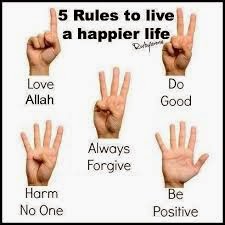Alhamdulillah..
Since I join Pepias (Persatuan Pelajar Islam Selangor Darul Ehsan), I learn a lot of things.. I learned how to manage time properly..how to be good to others..how to make people feel comfortable with me..how to handle kids (lol) and especially the most important part is.. I learn what is the purpose of life! Which is HaKhaDa! "Hamba, Khalifah, and Dai'e"
But the most vital question in life is ‘Why are we here?’
Well, why are we here? To amass fame and fortune? To make music and babies? To be the richest man or woman in the graveyard for, as we are jokingly told, “He who dies with the most toys wins?”
No, there must be more to life than that, so let’s think about this. To begin with, look around you. Unless you live in a cave, you are surrounded by things we humans have made with our own hands. Now, why did we make those things? The answer, of course, is that we make things to perform some specific function for us. In short, we make things to serve us. So by extension, why did God make us, if not to serve Him?
If we acknowledge our Creator, and that He created humankind to serve Him, the next question is, “How? How do we serve Him?” No doubt, this question is best answered by the One who made us. If He created us to serve Him, then He expects us to function in a particular manner, if we are to achieve our purpose. But how can we know what that manner is? How can we know what God expects from us?
Well, consider this: God gave us light, by which we can find our way. Even at night, we have the moon for light and the stars for navigation. God gave other animals guidance systems best suited for their conditions and needs. Migrating birds can navigate, even on overcast days, by how light is polarized as it passes through the clouds. Whales migrate by “reading” the Earth’s magnetic fields. Salmon return from the open ocean to spawn at the exact spot of their birth by smell, if that can be imagined. Fish sense distant movements through pressure receptors that line their bodies. Bats and blind river dolphins “see” by sonar.
Certain marine organisms (the electric eel being a high-voltage example) generate and “read” magnetic fields, allowing them to “see” in muddy waters, or in the blackness of ocean depths. Insects communicate by pheromones. Plants sense sunlight and grow towards it (phototrophism); their roots sense gravity and grow into the earth (geotrophism). In short, God has gifted every element of His creation with guidance. Can we seriously believe he would not give us guidance on the one most important aspect of our existence, namely our raison d’etre our reason for being? That he would not give us the tools by which to achieve salvation?
So what does the Creator, God, tell us about our purpose in life? God states in the Quran that He created the human to be His trustee on earth. Mankind’s basic trust, our responsibility, is to believe in and worship God:
And I did not create the jinn and humankind except to worship Me… [Quran 51:56-58]
Some would hold that the purpose of life was to acquire wealth. Yet suppose they were to acquire millions of dollars, what then would they claim is their purpose after doing so?
If the purpose of life is to become wealthy, there would be no purpose after becoming wealthy.
The fact is that when people approach their purpose here in this life from the aspect of only gaining wealth, after collecting the money they have dreamed of their lives loose purpose and then they live in restless tension suffering from a feeling of worthlessness.
How could wealth then be considered as the aim of life?
Could the acquisition of wealth guarantee happiness? Of course not.
When we hear of millionaires or members of their families committing suicide, how could we consider the purpose of life would be to gain great wealth?
A child of 5 years would obviously prefer a new toy to a deposit slip for a million dollars.
A teenager does not consider millions of dollars in the bank a substitute for movies, videos, pizza and hanging out with his friends.
A person in their 80s or 90s would never consider holding on to their wealth in place of spending it to hold on to or regain their health.
This proves that money is not the main purpose at all the stages of one's life.
Wealth can do little or nothing to bring happiness to one who is a disbeliever in Almighty God, because regardless of what he or she would gain in this life they would always live in fear of what will happen to them in the end. They would wonder what would become of them and how they would end up.
Wealth and its accumulation as a purpose would be doomed to a temporary success at best and in the end it would only spell out self destruction.
So, what is the use of wealth to a person without belief? He would always fear his end and would always be skeptical of everything. He may gain a great material wealth but he would only lose himself in the end.
Worship of the One True Almighty God of the Universe [Allah in Arabic] as a primary goal or aim in life provides a believer with everything he needs to succeed in both this life and the Next Life.
The word for total surrender, submission, obedience, purity of heart and peace in the Arabic language is "Islam". Those who try to perform these actions are called "MU-slims" [Islam-ERs].
To a Muslim the whole purpose of life is "ibadah" or worship to the One True Almighty God on Terms and under His Conditions.
The term "worship" to a Muslim includes any and all acts of obedience to Almighty Allah.
Because Islam teaches that this life is only a test or trial for the individual to show him his true nature it is only natural that he would accept death as not so much an ending to everything but more as a beginning of the final and lasting life in the Hereafter.
Before entering into either of the final lodging places i.e.; Heaven or Hell, there must needs be a Day of Judgment or showing of one's true self to make them aware of their own nature and thereby understand what they have sent on ahead during the life here on the earth.
Every person will be rewarded [or punished] according to their attitude, appreciation and efforts during this stay on earth. None will be asked about the actions and beliefs of others, nor will anyone be asked regarding that which he was unaware of or incapable of doing.
As the life here is considered as an examination for the individual, the death stage is considered as a resting period after the test. It could be easy for those who were faithful and dedicated or it could be grueling and horrible for the wicked.
Reward and punishment will be in direct proportion to each person and it is only Allah, alone who will be the Final Judge over us all.
So in the teachings of the True Surrender, Submission, Obedience, In Sincerity and Peace to the Almighty One God [Islam], the line of life and its purpose is logical, clear and simple:
The first life is a test
The life in the grave is a resting or waiting place before the Day of Judgment
The Day of Judgment brings about the clear understanding of what will now happen to the individual based on his own desires and actions
The Permanent or Afterlife will either be spend in luxurious splendor or miserable punishment .
Following this clear understanding of life, the Muslim's purpose is clear.
First of all, he has no doubt in his mind that:
he is only created by Allah
he is going to spend a period of time in this material world [called "Ad Dunyah" in Arabic]
he knows he will die
he knows he will spend time in the grave, either pleasant or difficult depending on his own choice of attitude and actions
he knows he will be resurrected for the Day of Judgment
he knows he will be judged according to the most fair of standards by Allah the Almighty, the All
Knowing he realizes his attitude and actions are going to come under very close scrutiny
he knows that this short life compared to the Eternal Life was in fact, only for a test
This life is very meaningful and purposeful to the Believing Muslim, as he realizes that it will determine is outcome and permanent position in the Next Life.

.jpg)
.jpg)
.jpg)

 Anis Munira Khiruddin ❤
Anis Munira Khiruddin ❤ March 23rd ❤
March 23rd ❤ Second Year Student in UPSI ❤
Second Year Student in UPSI ❤ Really into reading and travelling ❤
Really into reading and travelling ❤
 Hai. Welcome to my blog :)
Hai. Welcome to my blog :) No harsh words and ads allowed here
No harsh words and ads allowed here Have a nice day ^^
Have a nice day ^^

No comments:
Post a Comment